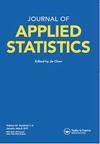一种基于精确投影追踪的多变量双样本非参数检验算法,适用于回顾性和组序贯研究
IF 1.2
4区 数学
Q2 STATISTICS & PROBABILITY
引用次数: 0
摘要
摘要研究中经常需要对多元分布进行非参数检验。通常需要基于相对较小的载体样本的测试程序准确地控制相应的I型错误率。通常,在多元检验中,无零分布的单变量方法的扩展,如Kolmogorov-Smirnov和cram本文章由计算机程序翻译,如有差异,请以英文原文为准。
An exact projection pursuit-based algorithm for multivariate two-sample nonparametric testing applicable to retrospective and group sequential studies
AbstractNonparametric tests for equality of multivariate distributions are frequently desired in research. It is commonly required that test-procedures based on relatively small samples of vectors accurately control the corresponding Type I Error (TIE) rates. Often, in the multivariate testing, extensions of null-distribution-free univariate methods, e.g., Kolmogorov-Smirnov and Cramér-von Mises type schemes, are not exact, since their null distributions depend on underlying data distributions. The present paper extends the density-based empirical likelihood technique in order to nonparametrically approximate the most powerful test for the multivariate two-sample (MTS) problem, yielding an exact finite-sample test statistic. We rigorously apply one-to-one-mapping between the equality of vectors' distributions and the equality of distributions of relevant univariate linear projections. We establish a general algorithm that simplifies the use of projection pursuit, employing only a few of the infinitely many linear combinations of observed vectors' components. The displayed distribution-free strategy is employed in retrospective and group sequential manners. A novel MTS nonparametric procedure in the group sequential manner is proposed. The asymptotic consistency of the proposed technique is shown. Monte Carlo studies demonstrate that the proposed procedures exhibit extremely high and stable power characteristics across a variety of settings. Supplementary materials for this article are available online.KEYWORDS: Density-based empirical likelihoodexact testmultivariate two-sample testnonparametric testprojection pursuit AcknowledgementWe are grateful to the Editor, the AE and two reviewers for helpful comments.Disclosure statementNo potential conflict of interest was reported by the author(s).
求助全文
通过发布文献求助,成功后即可免费获取论文全文。
去求助
来源期刊

Journal of Applied Statistics
数学-统计学与概率论
CiteScore
3.40
自引率
0.00%
发文量
126
审稿时长
6 months
期刊介绍:
Journal of Applied Statistics provides a forum for communication between both applied statisticians and users of applied statistical techniques across a wide range of disciplines. These areas include business, computing, economics, ecology, education, management, medicine, operational research and sociology, but papers from other areas are also considered. The editorial policy is to publish rigorous but clear and accessible papers on applied techniques. Purely theoretical papers are avoided but those on theoretical developments which clearly demonstrate significant applied potential are welcomed. Each paper is submitted to at least two independent referees.
 求助内容:
求助内容: 应助结果提醒方式:
应助结果提醒方式:


